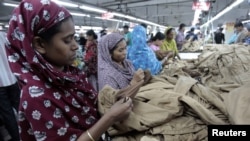NEW DEHLI —
Bangladesh’s garment industry has emerged as the second largest exporter in the world after China. But as the country becomes a major hub for global retailers - low wages and poor working conditions in the sector are attracting international scrutiny.
At the nearly 5,000 garment factories in Bangladesh, 3.5 million workers - mostly women - bend over sewing machines, stitching clothes for leading global retailers such as Gap, Tommy Hilfiger, Tesco and Walmart. Their wages begin at around $37 a month - the lowest in Asia.
These low salaries have held down costs and helped Bangladesh's garment industry become the most competitive in Asia.
“They have continued to perform fairly well because a lot of manufacturing that was coming up in other countries, which are now becoming more expensive, including China and India, has continued to shift to Bangladesh," explained Raghav Gupta, a retail consultant with Booz and Company in New Delhi. "In comparison to India for example, the labor wages of Bangladesh are about one-third.”
But Bangladesh's low wages have also triggered unrest among laborers. In June of this year, hundreds of factories were shut over demands for better salaries and working conditions.
Labor unions say that double digit inflation is eroding their income. Workers complain about poor safety standards in many factories. The tensions between labor groups and the garment industry culminated in the murder of a labor activist Aminul Islam in April.
The protests and violence have prompted calls from international retailers and human rights groups for Bangladesh to raise workers' salaries.
The latest to add its voice to such demands is European retailer H&M. During a visit to Dhaka earlier this month, the company’s chief executive, Karl-Johan Persson urged Prime Minister Sheikh Hasina to increase the minimum wage.
An economist at Dhaka’s Center for Policy Dialogue, Khondaker Golam Moazzem, says such calls are justified.
“In recent times because of rising inflationary pressure, particularly rising house rent, that has affected workers much," Moazzem said. "In that context, workers' wage should have to be revised immediately.”
But Bangladesh’s factory owners fear higher salaries will erode their biggest advantage over other Asian countries.
The head of the Bangladesh Garment Manufacturers Association, Shafiul Islam Mohiuddin, says wages were raised two years ago, and are not due for another revision until 2015. He says the government is instead looking into the possibility of providing workers with subsidized food rations and housing.
“Our food inflation is coming down. Other inflation is going down," noted Mohiuddin. "We are looking very seriously where our workers are under stress. We are working very closely with the government on setting up dormitories and rationing and all those issues.”
Bangladesh's garment industry gets support from the government because it is the country's biggest industrial employer and its $19 billion exports make up 80 percent of the country’s foreign exchange earnings.
But analysts warn that Bangladesh's failure to address problems such as low wages could spell problems for the sector which is thriving despite the slowdown in Western countries.
At the nearly 5,000 garment factories in Bangladesh, 3.5 million workers - mostly women - bend over sewing machines, stitching clothes for leading global retailers such as Gap, Tommy Hilfiger, Tesco and Walmart. Their wages begin at around $37 a month - the lowest in Asia.
These low salaries have held down costs and helped Bangladesh's garment industry become the most competitive in Asia.
“They have continued to perform fairly well because a lot of manufacturing that was coming up in other countries, which are now becoming more expensive, including China and India, has continued to shift to Bangladesh," explained Raghav Gupta, a retail consultant with Booz and Company in New Delhi. "In comparison to India for example, the labor wages of Bangladesh are about one-third.”
But Bangladesh's low wages have also triggered unrest among laborers. In June of this year, hundreds of factories were shut over demands for better salaries and working conditions.
Labor unions say that double digit inflation is eroding their income. Workers complain about poor safety standards in many factories. The tensions between labor groups and the garment industry culminated in the murder of a labor activist Aminul Islam in April.
The protests and violence have prompted calls from international retailers and human rights groups for Bangladesh to raise workers' salaries.
The latest to add its voice to such demands is European retailer H&M. During a visit to Dhaka earlier this month, the company’s chief executive, Karl-Johan Persson urged Prime Minister Sheikh Hasina to increase the minimum wage.
An economist at Dhaka’s Center for Policy Dialogue, Khondaker Golam Moazzem, says such calls are justified.
“In recent times because of rising inflationary pressure, particularly rising house rent, that has affected workers much," Moazzem said. "In that context, workers' wage should have to be revised immediately.”
But Bangladesh’s factory owners fear higher salaries will erode their biggest advantage over other Asian countries.
The head of the Bangladesh Garment Manufacturers Association, Shafiul Islam Mohiuddin, says wages were raised two years ago, and are not due for another revision until 2015. He says the government is instead looking into the possibility of providing workers with subsidized food rations and housing.
“Our food inflation is coming down. Other inflation is going down," noted Mohiuddin. "We are looking very seriously where our workers are under stress. We are working very closely with the government on setting up dormitories and rationing and all those issues.”
Bangladesh's garment industry gets support from the government because it is the country's biggest industrial employer and its $19 billion exports make up 80 percent of the country’s foreign exchange earnings.
But analysts warn that Bangladesh's failure to address problems such as low wages could spell problems for the sector which is thriving despite the slowdown in Western countries.








